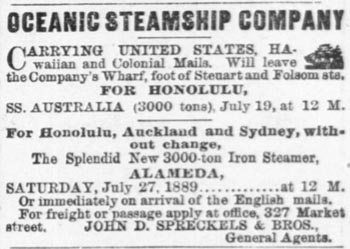VIPS in the Port of San Francisco during the 1800s
Claus D. Spreckels
J. D. Spreckels
C. A. Spreckels
John Diedrich Spreckels was born in Charleston, South Carolina, August 16th, 1853. The family moved to New York and then to San Francisco where he grew up. He studied at Oakland College and then in Hanover, Germany, where he studied chemistry and mechanical engineering in the Polytechnic College until 1872.
He returned to California and began working for his father, Claus, Sr., who had grown extremely wealthy in the sugar business. In 1876 he went to the Hawaiian Islands, where he worked in his father's sugar business. John D. Spreckels then established his own shipping enterprise in 1880 and became very wealthy in his own right.
July 7, 1889, Daily Alta California, San Francisco, California, U.S.A.
John D. Spreckels & Bros.
The firm of John D. Spreckles and Bros., was incorporated in 1880. It consists of the three brothers John D., Adolph B. and C. August. The firm was the largest shipping and commission business in San Francisco. They are agents for:
- The Hawaiian Sugar & Commercial Co.,
- Hakalau Plantation Co.,
- Hutchinson Sugar Plantation Co.,
- The firm of Messrs. W. G. Irwin &. Co.
Besides they control nearly a dozen other sugar plantations and handle one-half of the Hawaiian Islands.

They are principal owners in the Oceanic Steamship Co., and have four steamers in the service between San Francisco and the British Colonies of New Zealand and New South Wales, having the contract for carrying the mails between these points. The Oceanic S. S. Company also owns five and the Spreckels owns three sailing vessels, all of which are engaged in the sugar trade.
In connection with their colonial trade the Spreckels Brothers are agents for the Union S. S. Co., of New Zealand, a wealthy corporation, with a large and extended business, and also for Cowlishaw Bros., of Newcastle.
They also import about 200,000 tons of coal annually, for Pacific Coast requirements, the bulk of which is received from Newcastle in New South Wales. The firm is also agent for several large sugar and coffee plantation owners in Central America. The firm also holds the agency of the Union Insurance Co. (Marine) of Canton, and the Standard Marine Insurance Co., of Liverpool.

As individuals, the various members of the firm are also interested in the California Sugar Refinery, which has a capacity of 500 tons daily; in the Watsonville Beet Beet Sugar Factory, which has an output of 4000 tons of sugar yearly, and in the Occidental Beet Sugar Co., which has just been incorporated with a capital of $5,000,000 for the erection of a dozen more beet sugar factories throughout the State of California.
The whole of the vast shipping and commission business is managed by the eldest brother, and head of the firm, Mr. John D. Spreckels. The youngest brother, Mr. C. A. Spreckels, manages the California Sugar Refinery business, while Mr. A. B. Spreckels is now in Philadelphia managing the new Spreckels Refinery in that city.
February 8, 1895, San Francisco Call, San Francisco, California, U.S.A.
Has Nothing to Fear.
Rudolph Spreckels Says He Took No Part in the Rebellion.
Santa Rosa, February 7. Rudolph Spreckels confirms the news by mail to-day. A Call correspondent saw Mr. Spreckels at his ranch to-night. As to the story of his arrest he denies it. Seward visited Spreckels in San Francisco in October, but he had no letter from the ex-Queen relative to the purchase of arms to be used in the rebellion. He furnished no funds to the Queen and was not requested to assist Seward in any political work. Spreckels knew the Queen since he was 4 years old. He often called on her socially, but as he was not in politics he took no part and gave no advice. He always called openly and in the daytime. At first his sympathies were with the royalists, but now all he cares for is a stable government on the islands, where he has large interests.
Mr. Spreckels returns to Honolulu next April. He says he has nothing to fear as he has done nothing against the present Government. He was personally acquainted with the leading royalists, but as an American citizen, his policy has been one of strict neutrality.
F. F. Hollis, who at the time he was alleged to have been acting as Spreckels' agent was sick in bed in San Francisco. Spreckels and Follis enter a specific denial to all the charges set forth in the newspapers. Spreckels' denial is confirmed by Follis and their secretary, Bluxome.
May 26, 1895, San Francisco Call, San Francisco, California, U.S.A.
GOOD FAITH QUESTIONED.
C. A. Spreckels Maintains His Suit Against the Oceanic Company.
SAYS HE WANTS A MEETING.
Yet He Never Asked the Shareholders to Call One for Him.
Judge Seawell devoted almost the whole of yesterday to the trial of the case of C. A. Spreckels Jr. against the Oceanic Steamship Company. C. A. Spreckels Jr. has asked for a writ of mandamus to compel the company to bold its annual meeting.
D. M. Delmas of Delmas & Shortridge, attorneys for the company, read its answer to the complaint and showed that the company had already held its annual meeting on January 21 last, when the plaintiff, C. A. Spreckels Jr., had no right to vote, and that since then there has been no occasion for another meeting. The answer strongly questioned the good faith of C. A. Spreckels Jr. in invoking the unnecessary aid of the courts.
Secretary E. H. Sheldon of the Oceanic Steamship Company produced the books of the company and gave an account of C. A. Spreckels Jr. asking to be allowed to vote at the annual meeting, although his stock stood in the name of C. W. Wheeler. He had then offered to vote Wheeler's proxy, but the by-laws prohibited any one voting a proxy unless he were a stockholder of record. The witness did not see any proxy. Afterward the meeting was adjourned sine die.
William Hoffschneider, a stockholder, testified that he had seen C. A. Spreckels Jr. at the meeting referred to, and had not attended any subsequent meeting. Spreckels Jr. had not voted on that occasion.
The plaintiff, C. A. Spreckels Jr., took the stand and gave his version of the meeting of January 21. He said as the owner of 3630 shares he had attempted to vote, but had been denied, although he claimed to nave exhibited a proxy to the president, John D. Spreckels. He had objected to the meeting because the transfer-books had been closed twelve instead of ten days before the date of the meeting.
The witness endeavored to intimate that the minutes of the meeting had been written up long afterward for some purpose. He had been invited by two directors to come on the board, and for that reason wished to vote his stock, which he denied that he had ever hypothecated.
Under cross-examination, C. A. Spreckels Jr. further admitted that C. S. Wheeler, on January 22, 1894, when elected director, had no more interest in the company than a stranger. The witness had only made one effort, about an hour before the meeting of January 31, 1895. to have his stock transferred from Wheeler's name to his own.
It was shown that C. S. Wheeler had ceased to be a director on January 21, 1895, when the stock standing in his name had, after the annual meeting, and before a meeting of stockholders to appoint directors, been transferred back to C. A. Spreckels Jr.
After recess there was an examination of the list of shareholders, and then John D. Spreckels, president of the company, took the stand. He testified very clearly as to the action of C. A. Spreckels Jr. at the meeting of January 21, 1895. No proxy had been produced, although there was a motion made as if to produce one. As the legality of C. A. Spreckels Jr. voting was questioned, a motion to adjourn had prevailed. The meeting was in every way regular, 17,500 shares of the 25,000 capital stock being represented.
Attorney Delmas called upon C. A. Spreckels Jr. for the proxy in question, hut the latter said it was in San Mateo. He was directed to produce it to-morrow, and in the meantime argument ensued.
Attorney Delmas confined himself at the time to a single issue, viz.: that the plaintiff was not entitled to the relief he desired, because he had not exhausted the legitimate means of securing his end before appealing to the courts.
"This action," said Mr. Delmas, "is based on a demand made on the directors of a company to call a meeting. No person can invoke the power of mandamus until he has made diligent endeavor lo secure by private solicitation the relief required." In the first place these directors have not been given enough time to comply with the request. They had only been noticed on March 15, and on the 23d suit had been commenced.
"In the next place there are three ways of calling a meeting — through the president or vice-president, through the directors or through the shareholders. Before an aggrieved party can come into court he must be prepared to show that he has tried all three ways.
"If the directors have met and declined to call a meeting it remains for the plaintiff to show that he has failed to get the majority of the stockholders to call it. I suppose if the stockholders don't choose to nave a meeting then the law says there shall be no meeting. The will of a majority of the shareholders is the last recourse recognized by the law. It has not been shown that a majority of the stockholders desire a meeting. If it be true that a majority of the stockholders do not want a meeting it would be idle for a mandamus to issue compelling a meeting to be called; all they would have to do would be not to attend.
"If C. A. Spreckels Jr. has called upon the stockholders to call the meeting and has failed, it is of no use to call a meeting, and if the stockholders have not refused to call the meeting then there is no power in the court to compel the directors to call a meeting."
Attorney Cole for C A. Spreckels Jr. endeavored to show that the directors "controlled" a majority of the stock, but this was negatived, and the answer was amended by the insertion of a denial of such a statement.
The matter then went over until Monday, when C. A. Spreckels Jr. will be asked to produce the proxy of C. S. Wheeler, which he said he attempted to vote at the meeting of January 21, 1895.
August 3, 1895, San Francisco Call, San Francisco, California, U.S.A.
CLAUS SPRECKELS WINS
Important Victory in the Legal Contest Begun by His Son.
AMENDED COMPLAINT FILED
Rudolph Spreckels' Motion to Dissolve the Sugar Stock Injunction Denied.
An important victory for Claus Spreckels in the suit to recover 5000 shares of Paauhau plantation stock from Rudolph Spreckels was gained yesterday in the Superior Court, Judge Slack denying the defendant's motion to dissolve the injunction.
This motion was made the occasion of a great deal of argument in the case, and the legal fight was a bitter one. Rudolph Spreckels had been enjoined from using the income from the 5000 shares of Hawaiian stock or in any way disposing of the property. The stock had been Conveyed to the son by Claus Spreckels, but Mrs. Spreckels, the wife of the latter, had not been a party to the conveyance, and as the stock was community property the transfer was held to be illegal.
Attorney Ach, representing Rudolph Spreckels, argued that the transfer was legal and that therefore the restraining order should be no longer held in force, and an entire day was devoted to the presentation of the case.
Delmas & Shortridge argued the other side of the case, and the main subject matter of the case was deeply gone into. The case was submitted to Judge Slack a week ago, and yesterday the decision was handed down.
An amended complaint was filed yesterday.
August 7, 1897, Los Angeles Herald, Los Angeles, California, U.S.A.
Spreckels Sugar

SAN FRANCISCO, August 6. Articles of incorporation of the Spreckels Sugar company have been filed. The capital stock is $5,000,000. Of this amount the organizers of the company, John D. Spreckels, A. B. Spreckels, A. F. Morrison, M. H. Weed and W. D. K. Gibson have each subscribed $11,000.
Producing beets and manufacturing sugar therefrom are to be the primary objects of the company, and incidentally the company will engage in agriculture, will build, equip and manage factories and refineries, deal in real estate, construct railroads, build ships, and do all other things necessary for the successful development of the sugar-making business.
January 26, 1898, Sacramento Daily Union, Sacramento, California, U.S.A.
Hawaii and Sugar.
If the United States should decide not to accept Hawaii's offer of annexation, the fate of the islands would not remain uncertain for any length of time. They are now waiting to be annexed, and if the American people reject them, there are other wide-awake powers waiting and anxious to snatch them without temporizing. It is hardly conceivable, however, that the people of this country will be so blind to their own interests as to act in this manner.

These islands, as has frequently been said, are the key to the Pacific, as they are in the line of all ships passing up and down that ocean and they will be of vastly more importance to the country when more direct communications shall have been established between the two oceans by means of the Nicaraguan canal. Opposition is being urged by some statesmen on the ground that the annexation of the islands will destroy or cripple the new beet-sugar Industry. It is impossible to understand why a moment's study of the situation does not eliminate this feature of the discussion.

The beet-sugar industry and the sugar industry of Hawaii do not in any way interfere. Sugar beets are now being raised with profit in various sections of the country, nowhere more so than on the Pacific slope, and the California factories have had to compete with the full force of the Hawaiian sugar industry, the treaties of the United States with those islands having, for years past, admitted their sugar free of duty. The condition, from the beet-sugar standpoint, will not be changed in the slightest by the annexation of the islands.
February 19, 1898, San Francisco Call, San Francisco, California
Equipping a Sugar Factory
Salinas, Feb. 18. - The Risdon Iron Works has contracted with the Spreckels Sugar Company to place the machinery in position in the sugar factory near this city. It has sublet the contract to the California Bridge Company, which since Wednesday has placed six of the forty-eight ten-ton crystalllzers in position.
U.S. Beet Sugar Manufacturers, 1880s-1906 | |
| Daily Slicing Capacity/ Tons Beets | |
| Alameda Sugar Company, Alvarado, California | 800 |
| Spreckels Sugar Company, Est. 1899 | 1,000/3,000 |
| Sacramento Valley Sugar Company, Hamilton City, California, Est. 1906 | 600 |













 Copyright ~ 1998-2018.
Copyright ~ 1998-2018. 